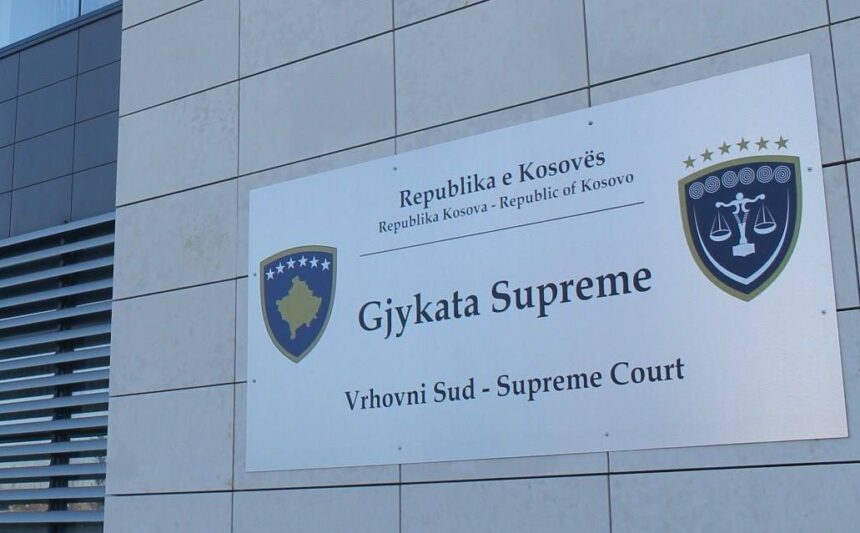Kosovo’s prolonged institutional formation crisis has been further exacerbated by a pivotal decision from the Supreme Court, which has declared the issuance of sub-legal acts by ministers concurrently serving as Members of Parliament (MPs) to be unlawful and a direct violation of constitutional provisions.
The ruling, dated July 15, specifically pertains to the annulment of an administrative instruction concerning the utilization of fiscal equipment, which was issued by acting Minister of Finance Hekuran Murati, who also holds an MP mandate. The Supreme Court unequivocally declared this instruction illegal and repealed it.
Government Challenges Ruling; International Community and Experts Urge Compliance
This judgment has elicited strong reactions across the political spectrum. The acting government swiftly condemned the decision as “arbitrary” and “unfounded in law,” contending that the Law on Government does not explicitly prohibit acting ministers from enacting sub-legal acts. In stark contrast, the Supreme Court issued a stern warning that any interference in its judicial decisions is “unacceptable.” Echoing this sentiment, Aivo Orav, the European Union Ambassador to Kosovo, affirmed: “Interference in the judiciary is unacceptable.”
Legal experts specializing in constitutional matters have uniformly affirmed the Supreme Court’s decision as just and legally binding. They underscore that any failure to adhere to this ruling could indeed constitute a criminal offense. Radio Free Europe’s inquiries to the acting government and Minister Murati regarding their intended actions following the judgment went unanswered. The government also refrained from commenting on whether it is considering a cessation of executive functions for ministers who simultaneously serve as MPs.
In a significant development, the Democratic League of Kosovo (LDK) on July 16 formally submitted a request to the Special Prosecutor’s Office, seeking criminal investigations against the acting government. The Supreme Court’s ruling on the fiscal equipment issue was presented as key evidence, with LDK MPs Besian Mustafa and Alban Zogaj asserting that the decision “confirmed that the acting government has acted unlawfully” since the ministers’ certification as MPs on March 27.
Legal Precedent Set; Implications for Future Governance
Vullnet Bugaqku of the Kosovo Democratic Institute (KDI) emphasized the profound implications of the Supreme Court’s decision. He stated that the ruling is “full and legally binding,” and that “any disobedience or disrespect of this decision constitutes a criminal offense.” Specifically, Bugaqku highlighted that if Minister Murati continues to enforce the annulled Administrative Instruction, he would be “committing a criminal offense” by failing to implement the Supreme Court’s judgment.
While this specific ruling currently applies solely to Minister Murati’s Administrative Instruction, Bugaqku indicated that it sets a significant legal precedent. This decision suggests that other similar acts issued by officials holding dual executive and legislative functions could also be deemed unlawful and consequently be subject to legal challenge. “This Supreme Court decision can serve as a good precedent or a sufficient legal basis for all those parties negatively affected by the decisions of public officials,” Bugaqku remarked.
However, Bugaqku also voiced concern that the ruling, while clarifying the conflict of interest inherent in dual roles, could be exploited by parliamentary parties, potentially “further hardening and cementing the positions of the parties,” thereby hindering political cooperation.
Prosecution’s Role and Broader Crisis Context
Constitutional Law Professor Mazllum Baraliu concurred that the Supreme Court’s decision is sound. He noted that it is now incumbent upon the prosecution authorities to assess whether sufficient grounds exist for initiating criminal proceedings. Baraliu cautioned that ministers operating with conflicts of interest “not only may violate provisions mentioned in the judgment, but a legal basis can also be found for someone to prosecute them.” He added that Kosovo’s judicial system does not automatically apply precedents, meaning that other potentially unlawful acts by dual-role ministers would need to be challenged individually through new lawsuits.
With at least 17 criminal complaints already filed against acting ministers by the LDK, the legal ramifications of this ruling are poised to intensify.
Kosovo remains under an acting government, as the Assembly has failed to constitute following the February elections due to persistent political deadlock. The 48th attempt to constitute the Assembly is scheduled for July 17.







